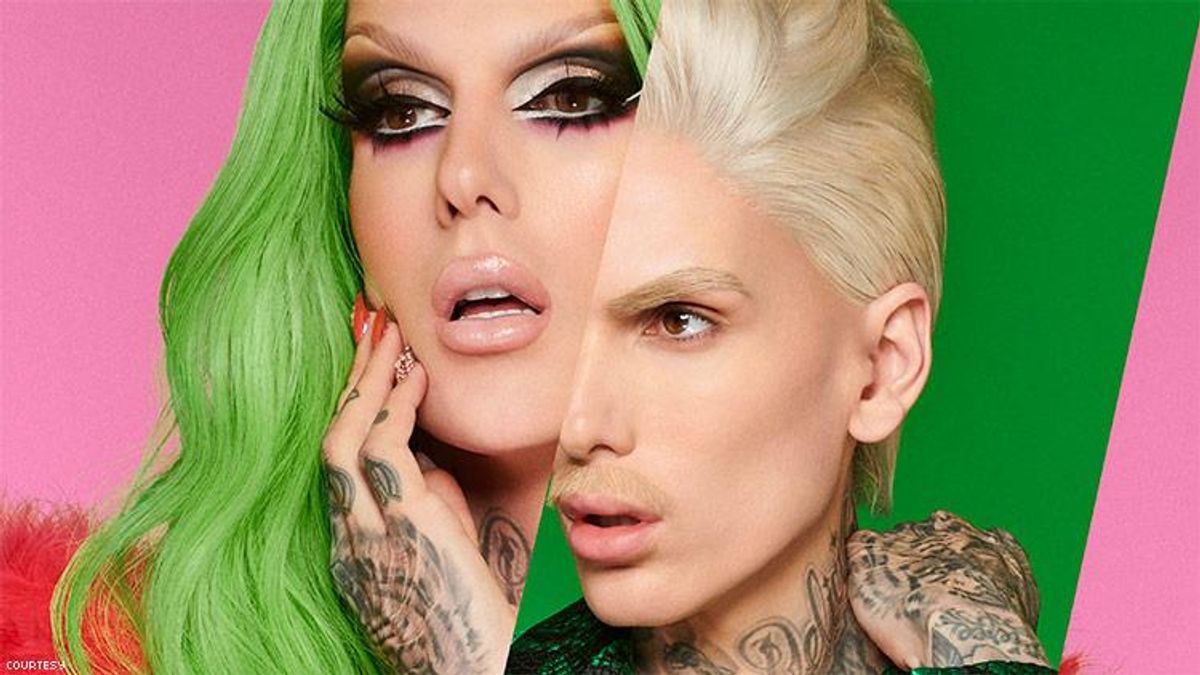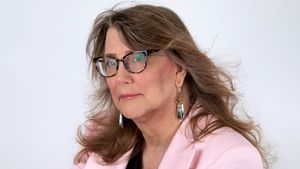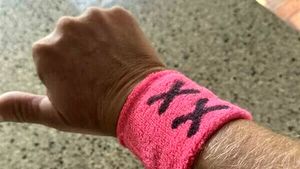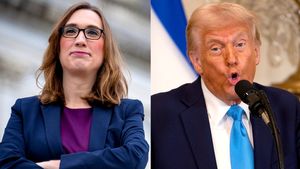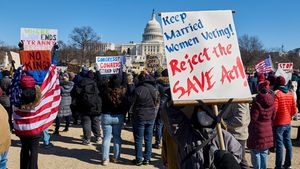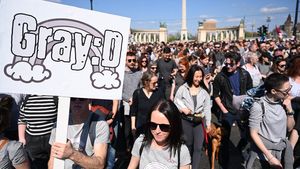The rise of Jeffree Star runs almost directly parallel to the rise of social media itself. While most of us were using Myspace's Top 8 feature as a form of social warfare, Star was pioneering the idea of building a brand online. Between his outrageous persona, Warped Tour-ready singles, Hot Topic-approved merch, and a body covered in tattoos, Star was both a product of his time and the person most ready and willing to sell that product.
But with the advent of YouTube, all that changed. Star funneled the last of his Myspace-era capital into a trio of liquid lipsticks, in the days before Kylie Jenner's billion-dollar beauty business was covering Forbes. Star was in the right place at the right time, leveraging his persona to launch his beauty brand just as the nascent makeup community was beginning to coalesce online. His following grew at an astronomical rate, and he's now the most followed beauty guru on YouTube, with almost 16 million followers, and last year Forbesnamed him as one of the top earners on the platform, netting $18 million in 2018. Star was also the only beauty influencer to make the list, as well as the only queer person.
That's not to say Star's ascent has been a clear path. Dogged by controversy -- his very public, very racist comments and an ever-growing list of public squabbles and ex-friends -- there might be an alternate universe where Star, like many of his unlucky contemporaries, found himself on the canceling block. But in 2018, Shane Dawson showed the world a more vulnerable side of the trash-talking mogul in his YouTube docuseries The Secret World of Jeffree Star. The series cast Star as a confident, competent businessman who clawed his way out of early poverty and trauma to become the kingpin he is today, someone who wants the chance to atone for his missteps while still being unapologetically himself. After all, that's why we click play.
Since the series, Star has been on an upswing, one solidified by his recent collaboration with indie cosmetics brand-turned-industry-powerhouse Morphe. Not content to merely sell his own products in Morphe's stores, Star has launched three collections with them over the past year, the last of which dropped earlier this month.
In the midst of the Morphe launch, Out spoke with Star about building his empireandthe power of queer men dominating the beauty industry.
As a cosmetics mogul with your own wildly successful line, what made you decide to do this collab with Morphe?
I've been getting asked since day one to do a cheaper price point. I always keep my prices kind of reasonable, but it is more that Sephora, more luxury, top-tier price. So Morphe has been really close to me for a long time. The owners and I kind of grew up together in the beauty industry; we both started from scratch. So as they started to grow I said, "Wow, I really want to do something at a drugstore price point." So we created this really unique cool collection. I tried to make it different than my brand. Obviously everything's pink, right? My whole world's pink, but I want to give them a little different experience, and it's been a huge hit. It's just been really magical for me. It's crazy.
You and Morphe have grown in these parallel ways, which also coincide with the way that the makeup industry itself has grown. It seems like you both got in at just the right time. When you started your brand, did you have some inclination that the beauty world was about to change?
I really did. I knew things were shifting, things were kind of dying and evolving, and I just saw the beauty industry finally catching up with the internet age. And I saw this explosion of makeup actually being a trend, whether it was the YouTube or the Kylie Jenner lip effect that the whole world was enamored by. Just so many factors kept the beauty industry evolving so rapidly, more so than I think ever before.
So it's crazy to see it now almost digressing. A lot of people [on YouTube] are not getting big views anymore. A lot of brands are flopping, so it's crazy to see the rollercoaster of the beauty industry.
How do you think it has changed since you entered the space, and what do you think we're seeing happen right now?
I am going to take a little bit of credit here. When I entered the beauty world, it was kind of shocking. I came from music, I had a cult following. I had always been asked to do tutorials and no one had ever really seen me without makeup until I rejoined YouTube. I had some old music videos on my channel, but I wanted to try YouTube and do it differently than what I saw my peers doing it the time. I'm said, "Wow, I have this brand. It's growing rapidly. How do we make it bigger, quicker?" That's always my goal.
So I joined YouTube with my polarizing personality, being so cutthroat, brutally honest, not ever taking money for reviews, I came in really hot. It shook people and I weeded out the people that were liars.
So now, a lot of people are falling off that people don't believe in. It's time for new blood, new faces, and it's a different evolution. People are kind of bored. The consumers, even myself, it's just kind of stale. That's why I want to keep the excitement and keep creating really wild, crazy stuff. Everyone's made eyeshadow. I'm so bored. It's the same color story. How do we make this different? Let's make a casket, let's make a bloody medical box. I just have so many crazy ideas. The industry needs more creativity.
In the beauty industry, which is entirely about consumption, so much hinges on trust. Your subscribers and your fans and your followers seem to really trust you. Why do you think that is?
I think because I have my own success. I'm on YouTube, but I also have had a long history. I've done a lot of stuff. I have my own brand, I own shipping fulfillment centers and real estate. So I'm not just a YouTuber. I didn't just start doing tutorials in my bedroom and now I'm running my own business.
When I came on this space, I didn't have anything to gain. I didn't need to lie or take money from a brand. I don't want to say any names because I don't even know who has done that. Let's say L'Oreal offered to pay me $300,000 to say that their concealer was great. People I used to be friends with would do that. I never wanted to do that. So I really took a stance of honesty, and the consumer and the customer can really see that. Like Jeffree doesn't need money. He's successful on his own, and he has nothing to gain.
I'm fascinated by this phenomenon where the most popular faces in the beauty industry, which is an industry largely targeted to young women, are queer men. There's you, Patrick Starrr, Bretman Rock, and James Charles. Why do you think that is?
I think it's psychological. People always ask why do women look up to gay men or people that are androgynous. They love gay hairdressers, the whole nine. It's always been like that. You enter this world and all those personalities that you mentioned, they're not just good at makeup. They're polarizing, they're captivating. You want to know about them. They're crazy. They're a little edgy, they're dangerous. And I don't know why women love to be taught by man with makeup. Ever since Kevin Aucoin, it's always been a phenomenon. I think we need to do a case study.
Do you think that the popularity of queer people in beauty, because the audience so young, is helping to create a more accepting younger generation?
100 percent. I remember 10 years ago, it was very crickets, right? I always felt very alone. Besides the greats like Bowie and Manson, I felt like there were really no people representing males in beauty. So to see it now with literally 12 year olds being makeup artists, being big on Instagram, it's so cool. And I love that those kids now, all these small towns, know that there's men that wear makeup. It used to be a secret. I would walk down the street when I was on tour, and people would look like I was a monster or a unicorn. So to be able to have so many men wearing makeup and being fearless, it's such a dream.
It's no secret that you're a polarizing and controversial figure. What do you say to people who don't think it's possible for you to have grown and changed?
Maybe that they don't know how to grow and change themselves. It's so important to let anyone grow. When you're looking at people online, whether it's celebrities, YouTubers, people love to do the pedestal game of, "Well, I'm not famous. So all my mistakes are a secret. But this person is so open." But people also love to tear you down. They love to build up. It's a psychological mess.
You are definitely a larger than life personality, but you were so vulnerable in your series with Shane Dawson last year. Was it scary to open up that much?
It was very scary, especially when you had been putting up walls mentally for years to even let someone glimpse in, let alone open the door, but for some reason, Shane just has a way of making you feel so comfortable and is actually a real friend.
I've been through a lot of fake friendships, a lot of backstabbing, and to just have a real friend, it was like, "Wow, this person is bigger than me, they have money. They don't need anything from me, and they genuinely care." It was kind of shocking, which is sad. But it was so fulfilling and it was just so beautiful to be able to move over humps that I didn't even know I had still.
How did doing that series change your life? Because from the outside it definitely seems like it in a way humanized you to people.
A lot of people didn't fully know me, oryou see me on Snapchat and all the clickbait [articles] of "This person versus Jeffree." So if you don't really know me or you just see glimpses, you do have, I think, a wrong perception [of me]. So it was cool to finally let people see more of the real me, and even my own audience learn so many new things that they hadn't known before that I really wasn't ever ready to share that I felt like it was time.
And I think we're in a generation where so many people are viewing us and we need to use it for good, and we need to let people know, "Okay, I may be this now, but I'm also still vulnerable and emotional and dealing with things just like everyone else." Because I hate the pedestal of, "Well they're rich, they're famous." We're all just human beings trying to make it through the day ourselves.
What do you think people would be most surprised to know about you?
If you don't really know me, I think it's shocking that I really don't go out much. I've never drank alcohol. I don't really party. I like reading books on my couch and smoking weed. It's kind of like a polar opposite of what everyone kind of sees online all the time. I'm a little calmer than people think.
You've teased recently that you have a lot of new products coming next year, can you reveal what any of those are?
I have been begged for a long time to make a foundation. I've been perfecting it for a while. I think that people really expect something magical. When I launched my concealer earlier this year, it was a two-year project. A lot of brands just pump things out to keep it moving. But I really want it to feel special, and not just like, "Okay, it's concealer, right? How do you make it better than just concealer?" And I think I accomplished that. So with the foundation, it's scary. It's like making your second album, it really better fucking be good.
So we are cooking up something really magical, so that will come out. We have the first ever Jeffree Star Cosmetics mascara formula coming out in the summer, and it's going to be a wild ride. And a lot of other stuff. There's some secret collaborations coming. So if they thought '19 was big, 2020 will be massive.
Speaking of a second album, are we getting any more Jeffree Star music in the future?
That's so crazy, because you really might. I have been cooking up a few things. We do have the 10-year anniversary of my first album coming up, so we might just drop a few bombs on everyone.
Are you an optimist or a pessimist? Are you hopeful about the future?
The future of the planet? Let's get dark. I'm not hopeful with climate change, how hot everything is. The earthquake, we might not be able to go outside in 20 years, maybe 10, so I'm very scared.
Well, that's why we need some really good foundation.
